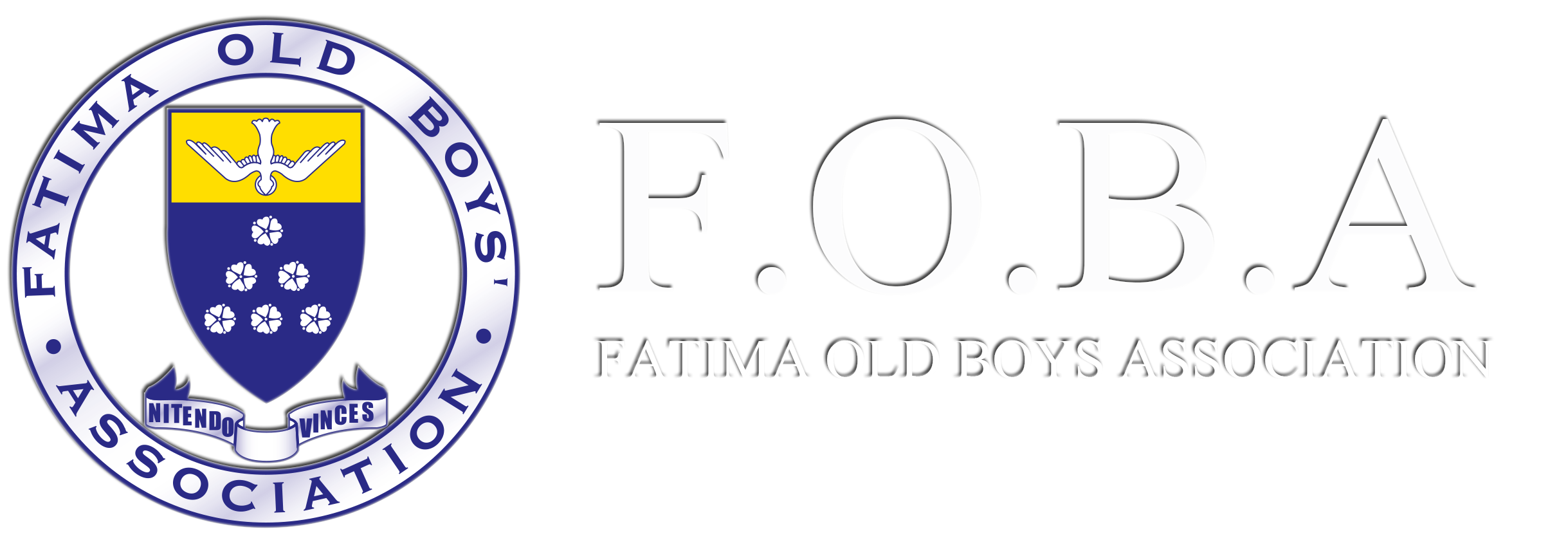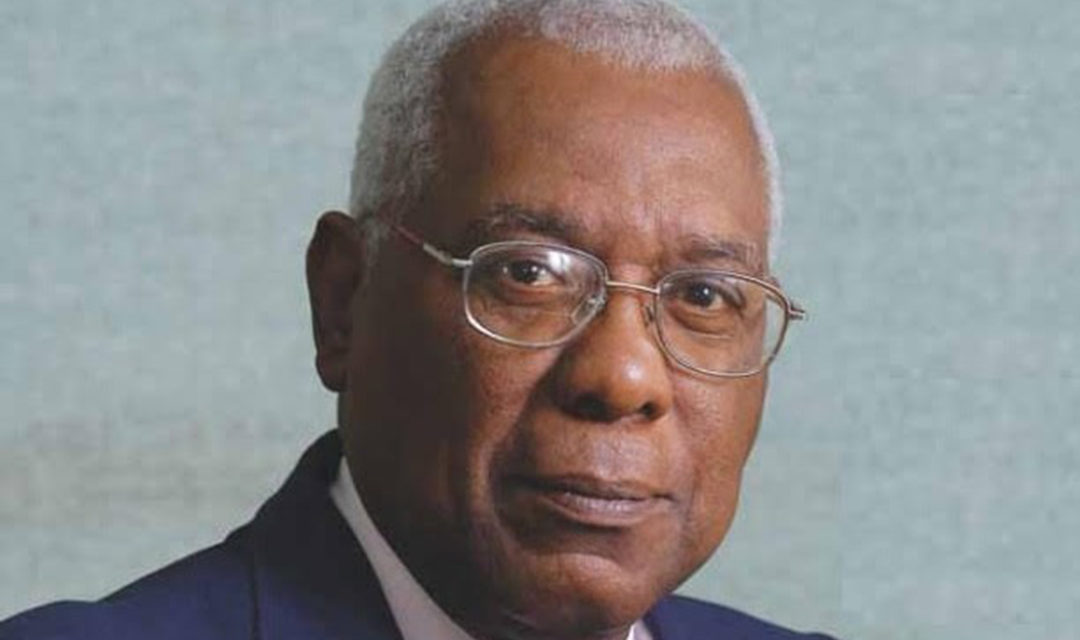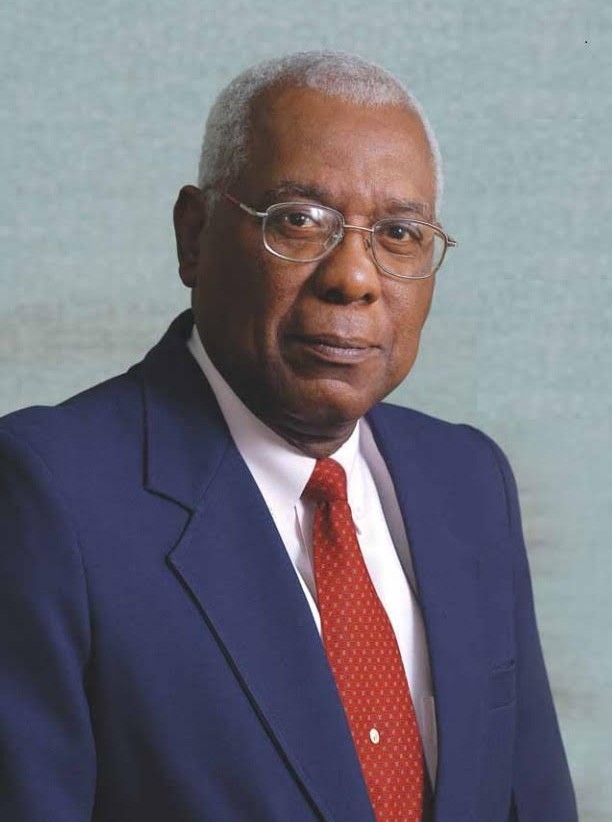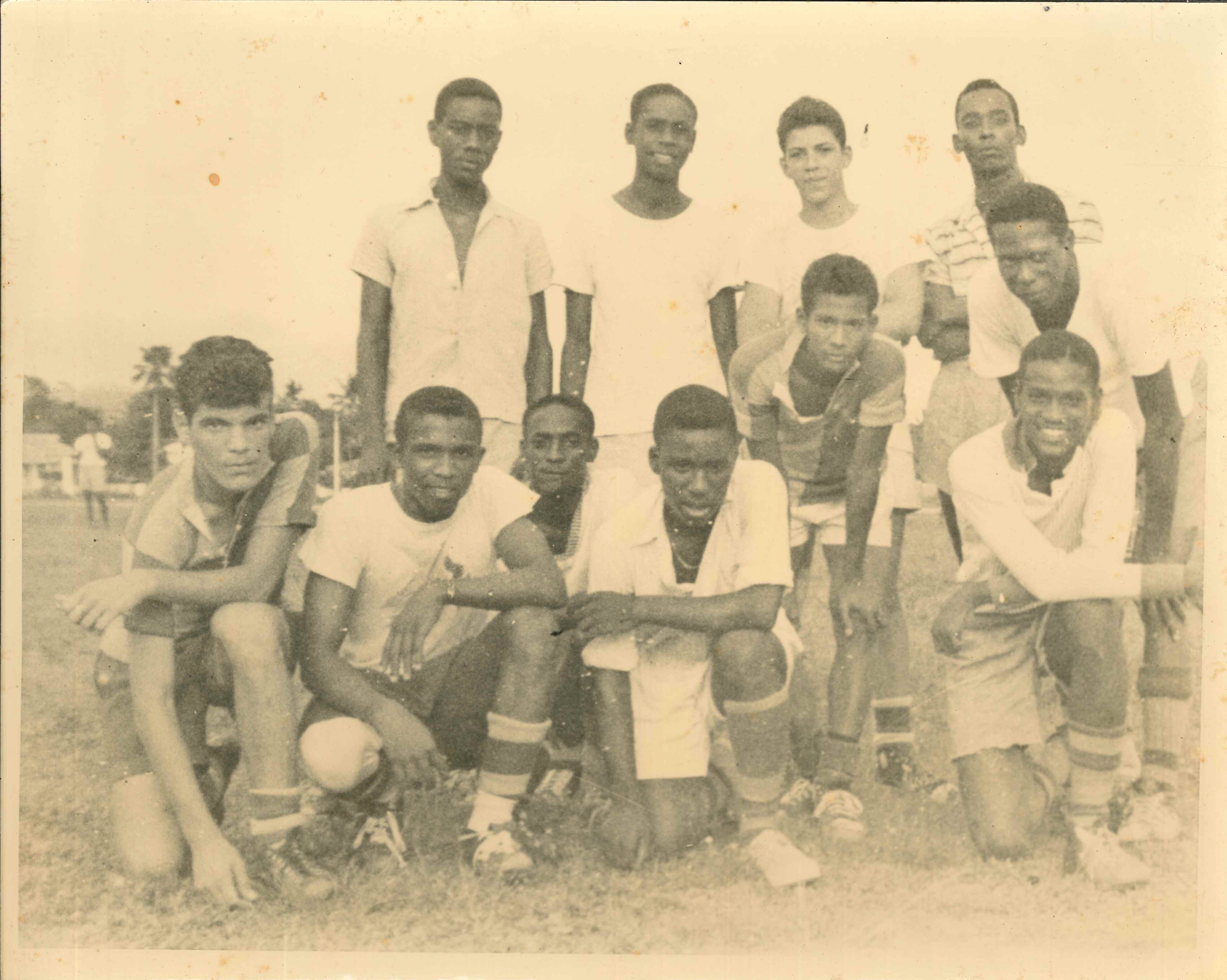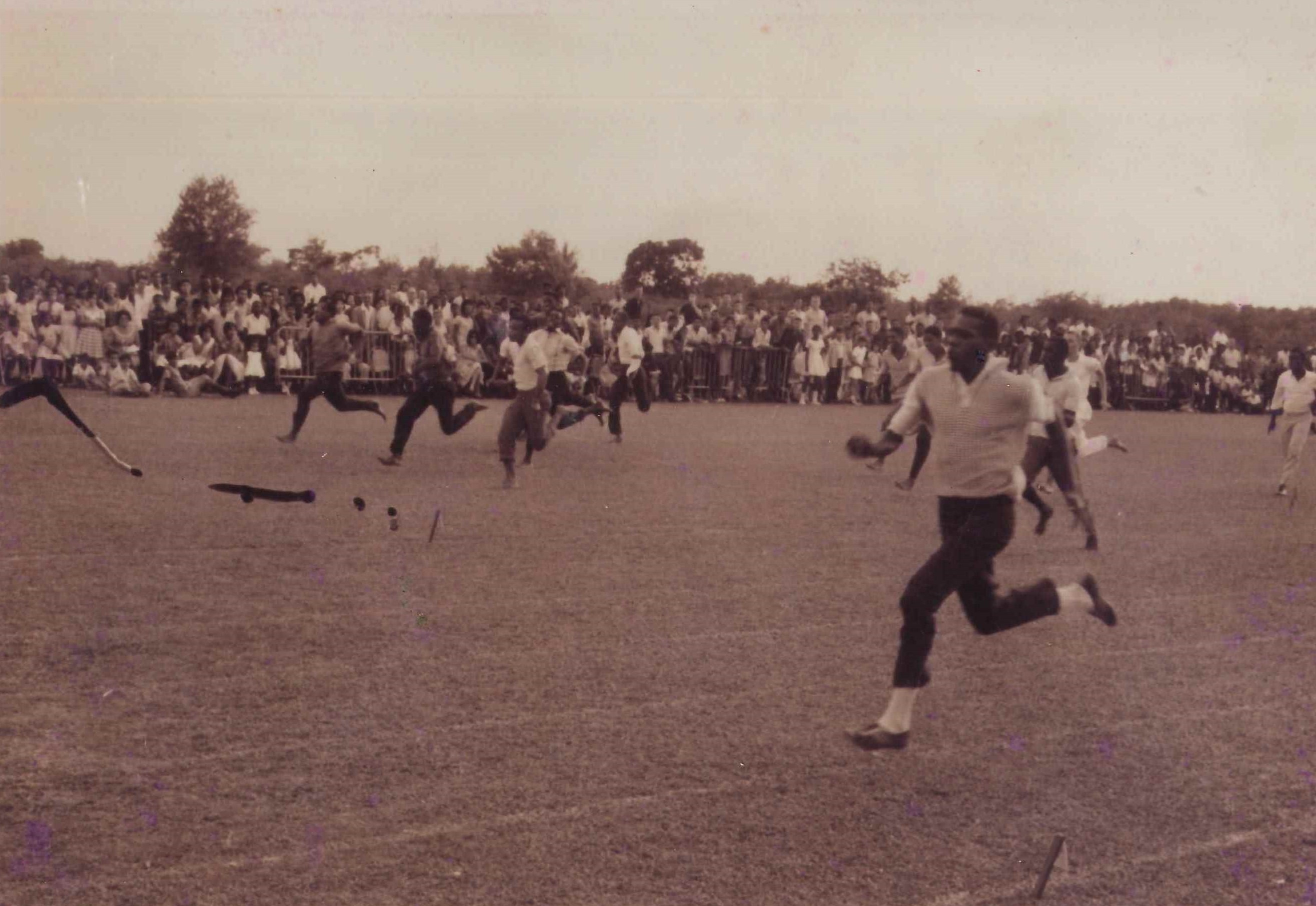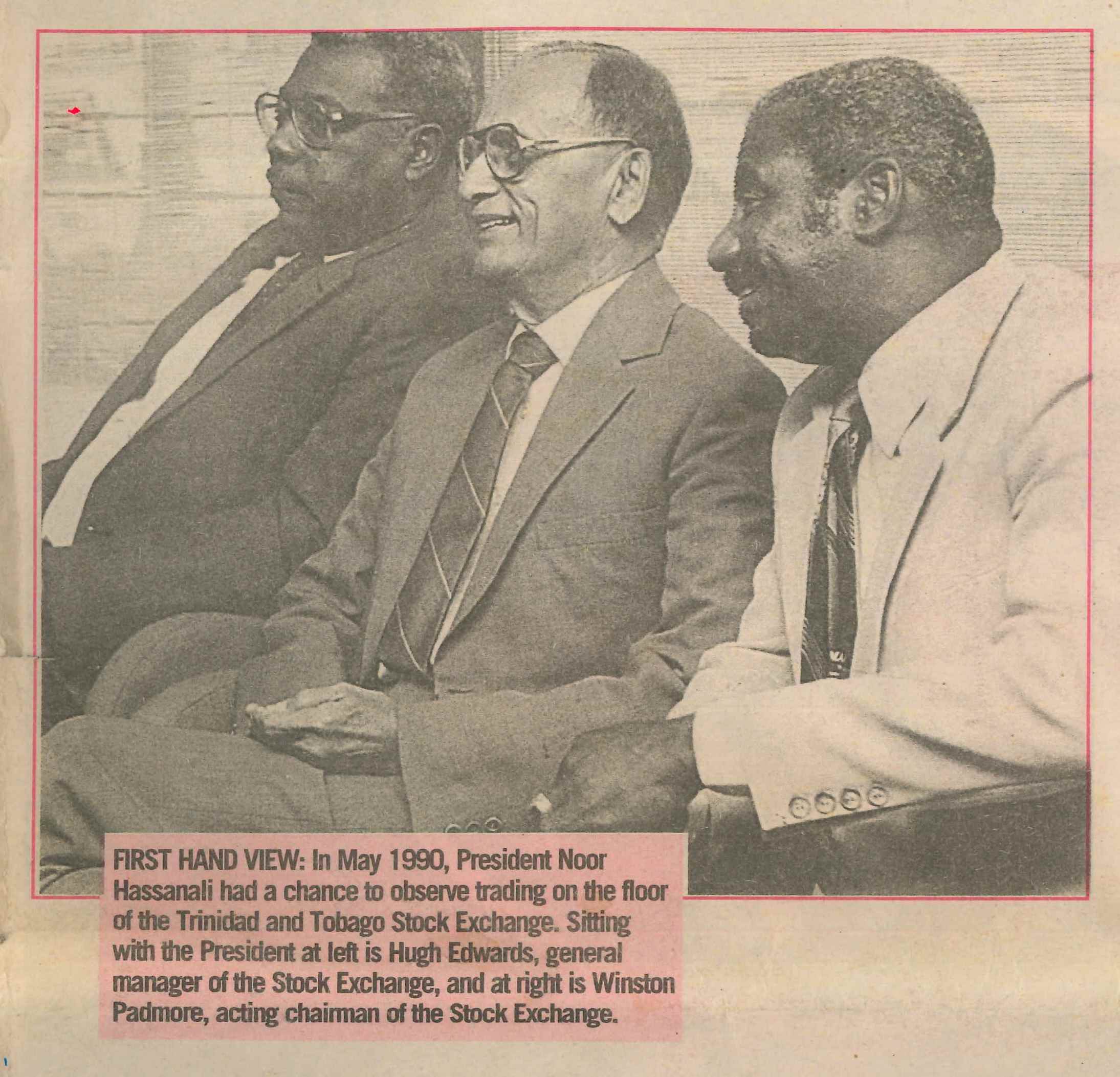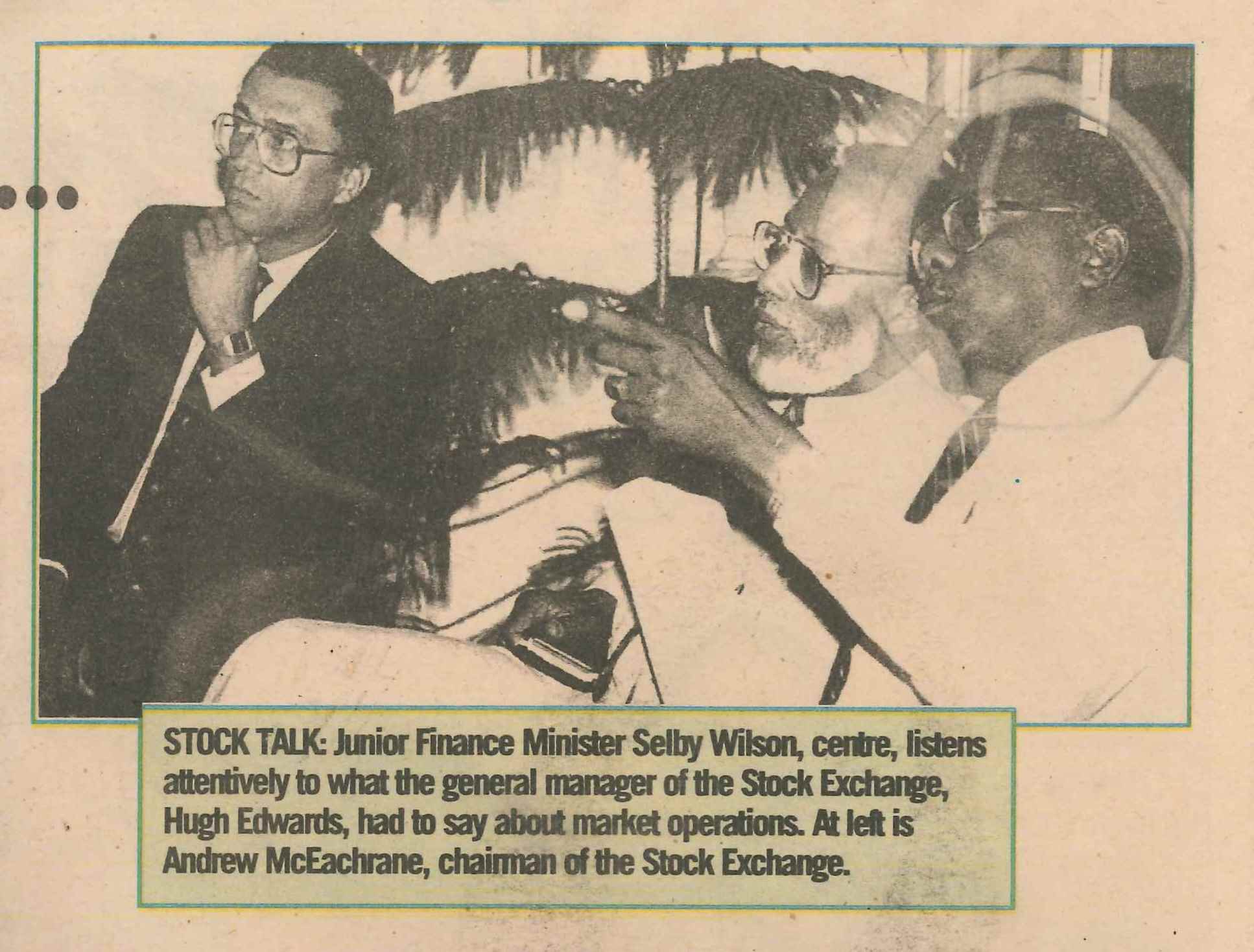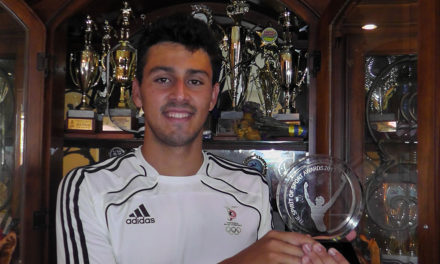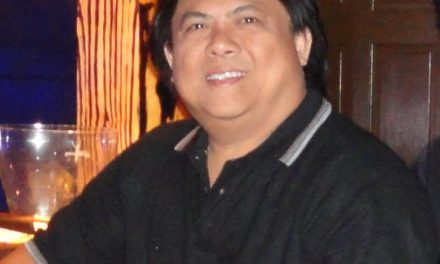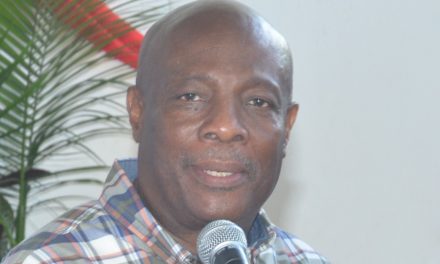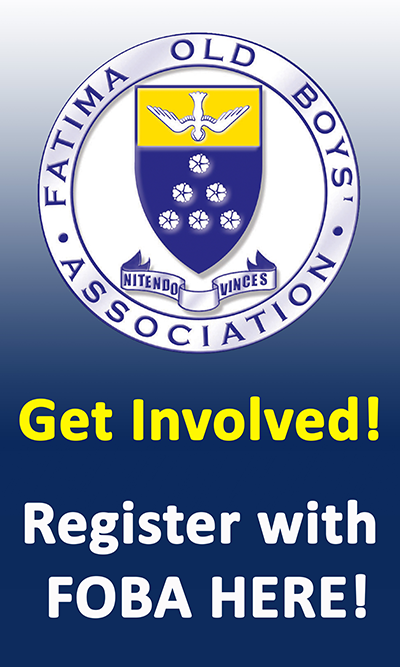- Views 2533
- Likes
1963: Intercol team after practice match
Back row L-R: Paty Chang (Captain – 1964) deceased, Carl Thomas, Dennis Gonzalves, Ray Darceuil
Center: Alloy Lequay, Hugh Edwards (Vice Captain- 1963 & 1964)
Front Row L-R: Charles Patick, Merchie Elie, Malcom Felix (Captain – 1963) deceased, Alvin Ashton, Steve Lewis
1965 Alumni race
This is the first time Fatima held its own Sports Day. Previous to this occasion, the sports was held jointly with CIC on their grounds on Serpentine Road. This is because Fatima never had the present ground until 1965. The Ground was built from the proceeds of a Raffle drawn in 1964.
1990 with President Noor Hassanali and Winston Padmore, acting chairman of the Stock Exchange
1990 with Andrew McEachrane, Chairman of the Stock Exchnage, and Selby Wilson, Junior Finance Minister
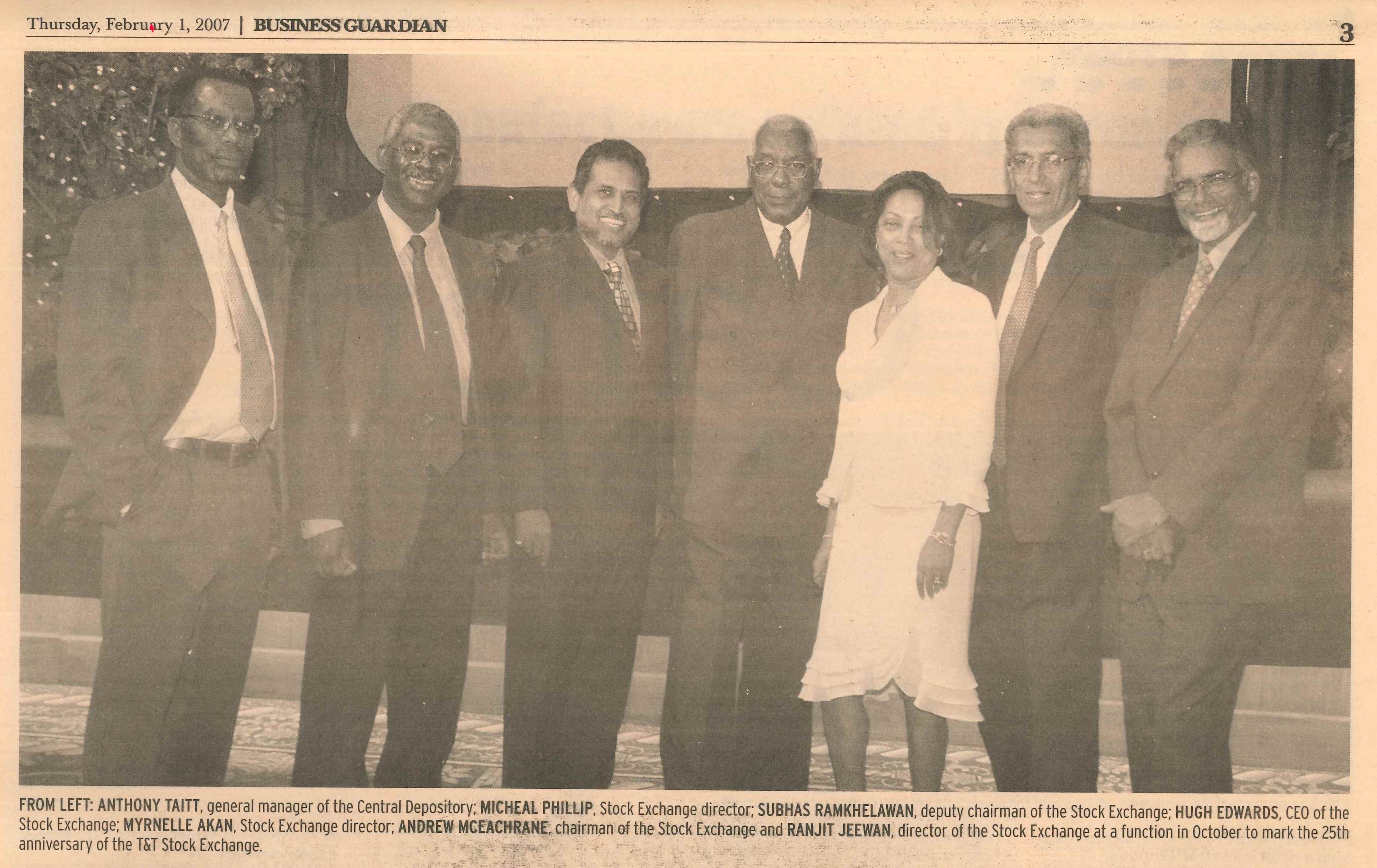
2007
Hugh Lennox Edwards (Class of 1961) would sail along the corridors of Fatima College of the Sixties, tall, lean and lanky in looks and style of walking, as if the breeze was carrying him, with a tilt forward that may have given him his nickname ‘Boasie’.
Casual as he was in his fine performances as an athlete, cricketer, football Inter-Col Vice-Captain (1960, ’61), he never gave a hint that he would blow through Fatima College, Mucurapo, to land at St Francis College, New York, to earn his Bachelor’s in Business Administration/Accounting.
In the US, he worked as an Auditor at (now) Deloitte Touche, and the New York Stock Exchange, from which he was recruited by the Trinidad & Tobago Central Bank to become the first CEO of the T&T Stock Exchange.
Here his Vice-Captaincy skills saw him net several ‘goals’: transforming the T&T Exchange from a manual trading system to a fully automated Trading/Clearing/Settlement System; authoring the document that led to the Securities Industry Act 1995; member of the Steering Committee working with NASDAQ to establish a Central Securities Depository for Caricom Stock Exchanges.
He has worked to help various financial institutions, lectured at the University of the West Indies School of Continuing Studies in Accounting, Financial Planning and Financial Management.
Retired today to full-time family life, Hugh remains the quintessential Fatima Boy of all ’round capability and contribution, still easy and breezy, thus reminding his peers that the ‘Hugh’ of his name was always simply the first syllable in the word ‘Humour’—his trademark at Fatima when he was known as The Comedian in College Residence.
Q: What influenced your choice of Fatima College for Secondary School?
A: Actually, my Father made this decision since my elder brother was a student at Fatima at the time.
Q: Tell us about your memories at Fatima – pleasant and/or non-pleasant? Fondest/Strangest memories? Any memorable nicknames?
A: Students in my time had an uncanny ability to attribute strange names to the Teachers. Names such as “Palance”, “Turkey”, “Porto”, Raja”, “Mambo”, “Gorgan Head”, “’Dread”…are some that I can immediately recall. My most unpleasant memory is that of a whipping that I got from the Dean of Discipline Fr. Kevin Power, for not playing in a re-match of a football game against CIC, after we were down 7-1 in the original game! The match had to be replayed since it was called it off five (5) minutes before full time as a result of fading light.
The Referee was from Fatima. My fondest memory is when Father Anthony Pantin, (later the Archbishop) in presenting me with a Cricket Bat for taking six wickets in a First Class cricket match, referred to me as “tall and handsome”. This reference resulted in a split decision among students at the time.
Q: Which teacher(s) positively impacted your school experience and life the most and which one(s) did you give the most trouble?
A: Mr. Earl Agustus, Mr. Mervyn Williams, Mr. Craigwell, and Mr. Stephen Coughland, a Prefect studying for the Priesthood at the time, are the individuals that left an indelible impression on my mind. As to the one that I gave the most trouble, it was Fr. Kevin Power, the Dean of Discipline. I hasten to add that after I returned to Trinidad in 1982 to take up the job as CEO of the Stock Exchange, we became good friends.
Q: What is the most valuable lesson that you learned at Fatima? How have you applied this in your career?
A: Nothing can be accomplished without God and prayers. That aside, you must know how to balance your time between work and pleasure.
Q: How did Fatima contribute towards making you the man you are today? What advice would you give to the present student crop on maximizing on their opportunity?
A: When I left Fatima, I had a desire to continue my education in a similar environment that stressed the importance religion, hard work and discipline, to which I was accustomed. Thus with the assistance of the then principal, Fr. Ryan, I chose St Francis College in Brooklyn , New York. In addition, my younger brother who attended CIC was a student there at the time. As to my advice to the present crop of students on maximizing their opportunity, let their watch words be: My Strength is my ability to get along with people, my weakness is that I try to be ‘too perfect’.
Q: Have you been able to maintain friendships with your classmates since school? Did your Class Year ever have a reunion?
A: I maintain a professional and social relationship with several of the students who attended Fatima during my time. This group of students, referred to as LFC D2, meet several times during the year for lunch, and teachers from our era are often invited to join us. Needless to say, “ole talk is at its best”.
Q: What do you see as the biggest challenge for the young boys of this era and what can Fatima do to support this?
A: The biggest challenge for young boys today is discipline and continuous education. Unlike in the past, students today have to deal with a society where morality, corruption and the lack of family values are most predominant, not to mention the electronic debacle. I believe that by inviting past students from both the professional and sporting arenas to bi-monthly forums with students, beginning with Form 1 or 2, could be of tremendous value.
Another challenge is the manner in which young men speak and carry themselves. They just do not know how to dress properly. Perhaps an informal session or two before graduation, in comportment and etiquette, could be of some value.
Q: You played cricket and football in Fatima. Did you have a preference or favorite? Did you play any other sports?
A: Yes. Cricket was my preference. I was also a member of the College Track Team captained by Mr. Earl Harris. When CIC and Fatima held their annual Sports Day together in 1959, I was the Junior Victor Ludorum winner.
Q: You worked at the New York Stock exchange from 1973 to 1982, at which time you took up the position of CEO of the Trinidad and Tobago Stock Exchange. Describe that transition from New York to Trinidad.
A: The transition was not easy. This is due to several reasons. First, having been away from Trinidad for about 18 years’, I then had to re-adjust to a different way of life. Secondly, I came out of the New York Stock Exchange where the Trading, Clearing and Settlement System was fully automated and electronically based. The system in Trinidad was a manual system and as such the rules were different.
Thirdly and perhaps most important, in most countries, the Securities and Exchange Commission (the SEC) is established before the Stock Exchange. This is because the underlying roles of both institutions vary. The SEC deals with Primary Market Activity, while the Stock Exchange is responsible for Secondary Market Activity.
On the local front, the Stock Exchange was established before the SEC! This meant that the Exchange had the responsibility of regulating both the Primary Market and the Secondary Markets. To further complicate matters, the Securities Industry Act in force at the time provided for a Board of Directors of nine (9) individuals, five (5) of whom were Stockbrokers. Thus, it was very difficult to change the operational aspect of the Exchange. To put it plain and simple, the Stockbrokers of the day possessed a talent for “creative irresponsibility”. In biblical terms it was “Render unto Caesar the things that are Caesars”.
Q: Are you in full time retirement now or have you been in and out of work related activities?
A: At the present time I am the Consultant and Corporate Secretary for the Issa Nicholas Group of Companies. I also hold Directorates in a few companies.
Q: Looking back on your life and career, is there any achievement that you are most proud of? Any regrets on past decisions made?
A: I think from a career prospective, I am proud of my contributions made at the Exchange. As CEO, I successfully directed the transformation of the Exchange from a manual trading system to a fully automated Trading, Clearing and Settlement System. In addition, I was also the author of the original document that promulgated the Securities Industry Act of 1995 which made provisions for the establishment of the Securities and Exchange Commission (the SEC).
I am also proud of developing the first Take-Over Code for the local market since none existed at the time. With respect to the Capital Requirements for Member Firms of the Exchange, this I developed and implemented. And, the Capital Rule is still in force today.
As to regrets, and though very thankful for my present family, I guess I am guilty of giving preference to professional development at the expense of my previous marriage. I almost made the same mistake again, but better sense prevailed.
Q: Was that career path something you chose or a path that you just happened to fall into?
A: The career path that I chose was Accounting. The Accounting Firm Haskins & Sells (H&S) that employed me after my graduation from St Francis College in 1969, were the Auditors for most of the stockbroking firms on Wall Street at the time. This is how I got involved in the Securities business. The experience garnered with them as an auditor was what propelled me to leave H&S and commence work at the New York Stock Exchange as an Accountant, in the Department of Regulation and Surveillance.
Q: Any hobbies or interests? Any guilty pleasures?
A: I enjoy reading and playing cards. Guilty pleasures – the Casino and horse racing in America. Obviously, I like my booze and a good lime.
Q: Do you follow any sports or have any favorite teams?
A: I enjoy looking at the IPL and also Test Cricket, once the West Indies is not playing. In soccer, my favourite team is Brazil.
Q: Please introduce us to your family.
A: My wife’s name is Kathleen. I have a son Pascalle who works at a local Bank and my Daughter Amelia is at UWI studying Accounting. My original family consists of three brothers and a sister, all of whom either live or lived abroad. Two of my brothers as well as my parents are deceased.
Q: What did receiving the Fatima Hall of Achievement award mean to you?
A: This feeling cannot be expressed in words. I am still on cloud nine, so once I come down I may be in a better position to answer this question. I never expected the unexpected.
(I am grateful to Keith Simpson for recommending me!)
Q: Do you have any recommendations to FOBA as to what benefit you would appreciate as an alumni?
A: Yes. The hosting of an Open House annually for past students. In this case, students from different eras can meet and socialize, which could result in the establishment of a data base that could only redound to the benefit of the College.
Q: Over the years FOBA has invested in school improvement projects such as installing smart boards, air-conditioning classrooms and sustaining the sports teams with coaches and kits. What projects or initiatives would you like to see the Alumni body and school implement in the future?
A: I would like to see the FOBA—with the cooperation of the College—offer assistance to a few students from schools where Form Six does not exist.
Q: Any closing remarks?
A: My parents aside, Fatima and the Holy Ghost Fathers have indeed been a blessing to me, not to mention the teachers.
